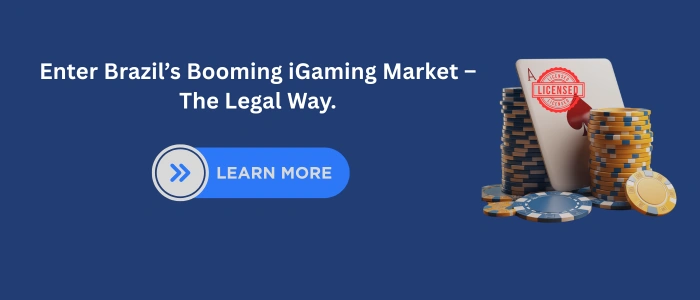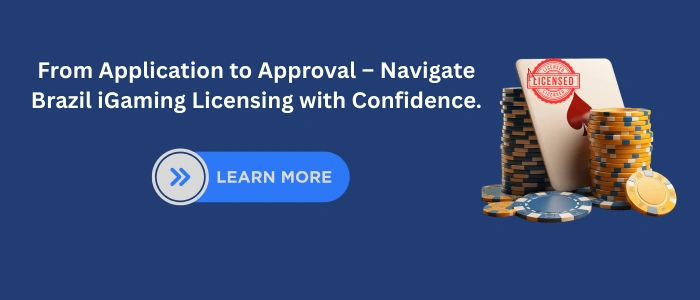Introduction
Brazil has become one of the most promising regions for the iGaming sector in Latin America. With a rapidly growing online betting market and evolving legal landscape, operators are exploring how to enter Brazil’s market legally and responsibly. Understanding the Brazil iGaming License, the current legal framework, and the process to apply is essential for businesses planning to operate in the region.
This guide walks through the essential elements of the Brazil online gambling regulation, the requirements, and how to obtain an iGaming license in Brazil. Whether you’re a startup or an established operator, this information will help you navigate Brazil’s gaming sector effectively.
Evolution of Gambling Regulations in Brazil

Brazil had a long-standing restriction on most forms of gambling until recent reforms began reshaping the landscape. The turning point came in 2018 when Federal Law No. 13,756 allowed fixed-odds betting on sports events. This was the first significant step toward legalizing online gambling in Brazil.
In 2023, new legislative efforts pushed the agenda further by regulating other areas of iGaming. These laws define the scope of permitted activities, designate regulatory oversight, and set the framework for licensing operators.
As of 2025, Brazil online gambling regulation allows online sports betting, casino games, and other fixed-odds wagering, provided the operator meets specific criteria and is licensed under Brazilian jurisdiction.
Why Brazil is a Strategic Market for iGaming Operators

Brazil is a strategic market for iGaming. It has a population exceeding 210 million and one of the most internet-connected societies in Latin America. Mobile gaming is on the rise, and the younger population is open to regulated online gambling platforms.
Additionally, the regulatory shift opens doors for local and international businesses to establish a legal presence. Operators seeking to scale in Latin America view iGaming license in Brazil as a critical asset in their expansion plans.
The Role of the Brazil iGaming Authority in Regulatory Oversight
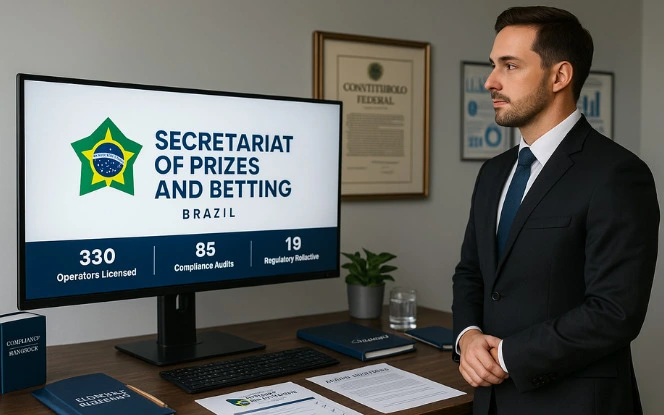
Oversight of the iGaming sector falls under the Secretariat of Prizes and Betting (Secretaria de Prêmios e Apostas), part of the Ministry of Finance. This body acts as the Brazil iGaming authority and is responsible for granting licenses, enforcing rules, and monitoring market activity.
It sets compliance guidelines covering data protection, responsible gambling, anti-money laundering, and fair play. Operators must align their business practices with these standards to remain licensed and avoid penalties.
The authority also maintains an open database of licensed entities, providing transparency to consumers and stakeholders.
Eligibility Criteria and Legal Requirements for Licensing
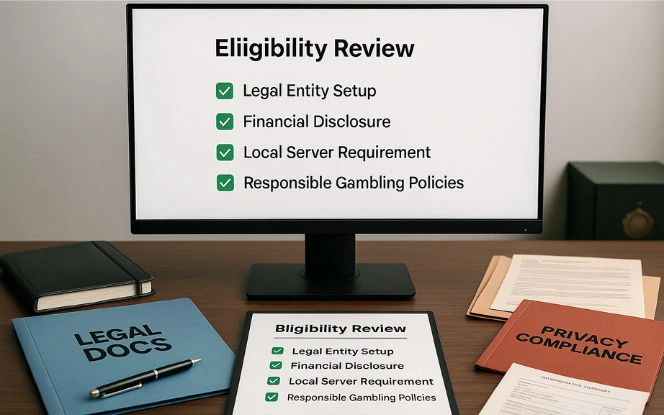
To apply for a Brazil iGaming License, an operator must be either a Brazilian company or have a registered Brazilian subsidiary. Foreign firms must partner with a local entity or establish a local presence to qualify.
The licensing framework favors companies with experience in gambling operations, robust data security systems, and a clear record of regulatory compliance in other jurisdictions. The application structure includes the following:
- Corporate documents
- Financial records
- Operational plans
- Technical platform specifications
- Responsible gaming policies
The operator must maintain a local server in Brazil or ensure that data access complies with Brazilian privacy laws.
Understanding the Brazil Betting License Requirements
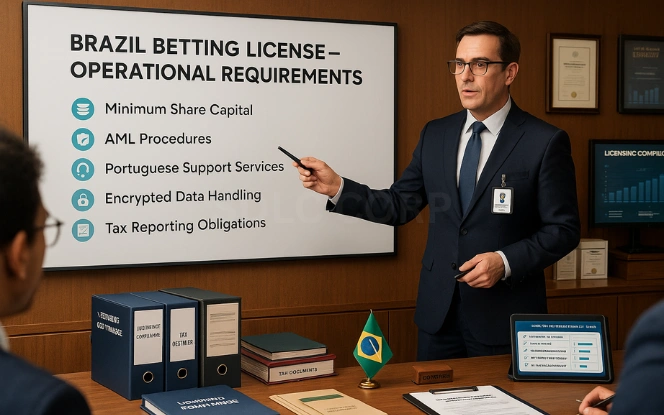
The Brazil betting license requirements are clear but extensive. Meeting them ensures legal operations and market access. Key requirements include:
- A minimum share capital, which varies by business size
- Proof of financial capability to sustain operations
- Data encryption and cybersecurity compliance
- Responsible gambling measures such as deposit limits and user controls
- Procedures for dispute resolution
- Dedicated customer support in Portuguese
- Ongoing tax reporting and financial auditing
Operators must also pay a licensing fee and maintain operational reserves as defined by the Brazil iGaming authority.
Step-by-Step Process to Secure an iGaming License in Brazil
Securing a Brazil iGaming License involves a structured application process governed by national legislation. Here is a structured step-by-step process to follow:
Step 1: Establish a Legal Entity in Brazil
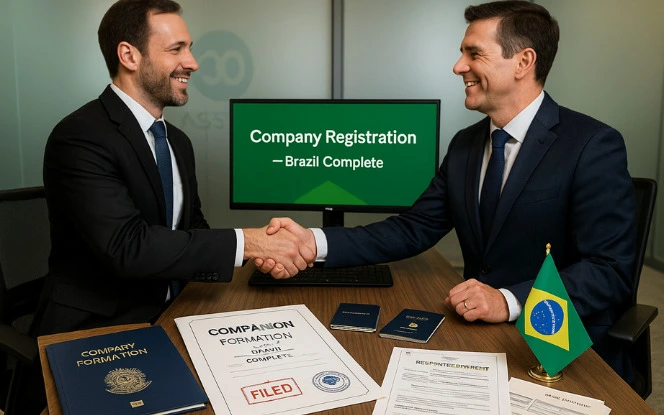
Form a local company or enter a legal partnership with a Brazilian business. This is mandatory to operate under the jurisdiction of Brazil.
Step 2: Prepare the Required Documentation
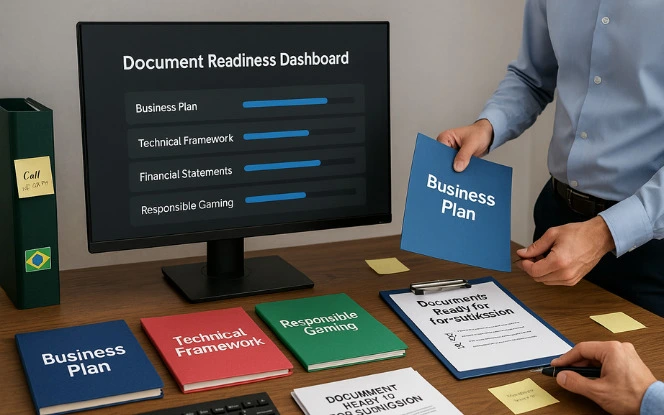
Gather and organize all documents including:
- Business plan
- Technical platform specifications
- Internal control systems
- Financial statements
- Responsible gambling policies
Ensure they meet the formatting and content standards defined by the Brazil iGaming authority.
Step 3: Submit the Application
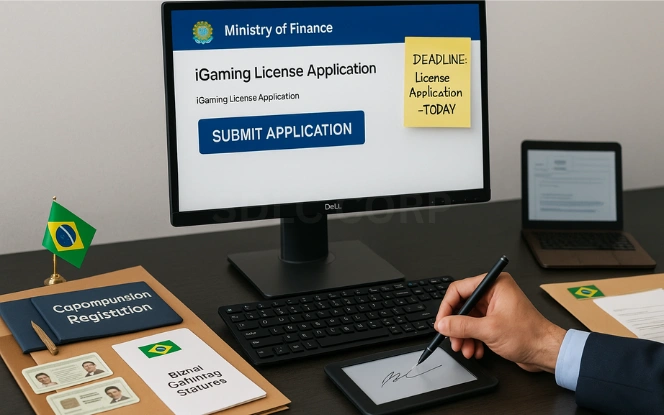
Use the Ministry of Finance’s online portal to upload all documentation and initiate the formal application.
Step 4: Pay the Licensing Fees
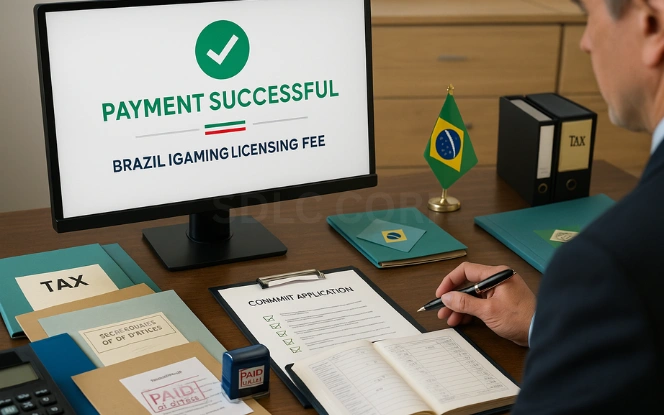
Submit the required application and licensing fees, which vary based on the size and scope of your business.
Step 5: Regulatory Background Check
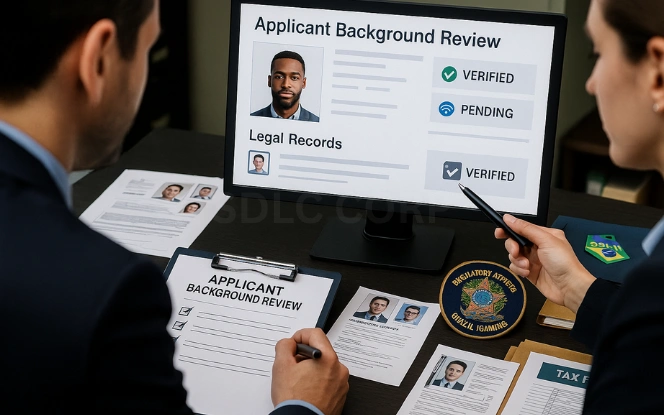
The regulator will assess your financial health, legal standing, data protection infrastructure, and platform integrity. This determines if your business meets the Brazil betting license requirements.
Step 6: Provisional Approval
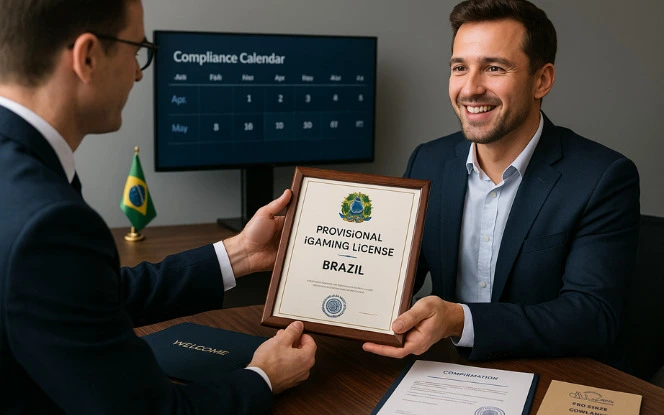
If the review is successful, your business receives provisional approval, allowing limited operations under regulatory observation.
Step 7: Final Inspection and Full License Issuance

After additional inspections and audits, your company may receive a full operational license.
Step 8: Maintain Ongoing Compliance
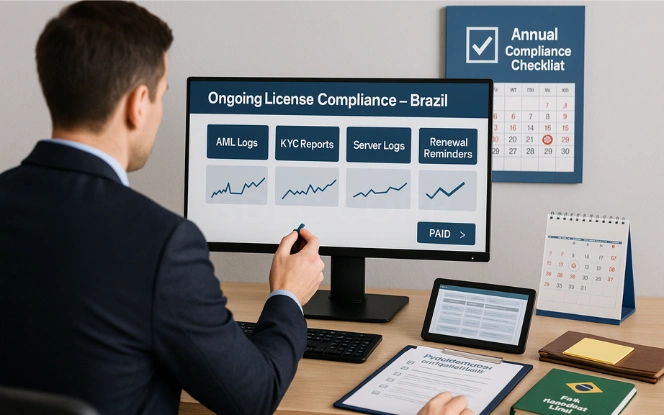
Ensure regular reporting, technical audits, and adherence to updates in Brazil online gambling regulation to keep the license active.
Taxation Policies and Financial Obligations for Licensed Operators
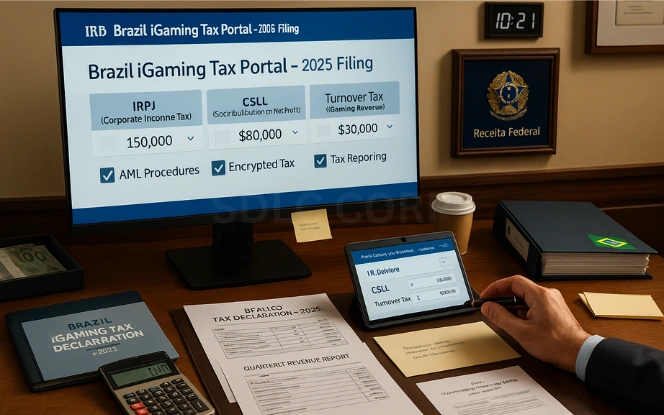
Tax obligations for licensed operators are well-defined. Revenue generated through iGaming is subject to taxation under Brazilian law. Operators pay both federal and local taxes, including:
- Corporate income tax
- Social contribution tax
- Tax on betting turnover (specific rates may apply)
In addition, operators must contribute to public welfare programs and sports development initiatives as outlined in national law.
Understanding these financial responsibilities is key to long-term sustainability and regulatory compliance.
Discover more: How Gaming Startups Manage Financial Compliance Globally
Data Protection, Security, and Compliance with Brazilian Law

Brazil enforces strict data privacy rules under the Lei Geral de Proteção de Dados (LGPD), similar to Europe’s GDPR. Any operator holding a Brazil iGaming License must adhere to these regulations.
This includes:
- Securing personal and financial data
- Obtaining user consent for data processing
- Offering users the right to access and delete their data
- Reporting data breaches within legal timeframes
The platform’s technical architecture must support data security, transaction transparency, and fair play mechanisms.
Relevant post:Legal Aspects of Online Gaming in India
Implementing Responsible Gambling Measures and Player Protections

Operators are required to promote responsible gaming. This is not optional under Brazil online gambling regulation. Specific features must be implemented within the gaming interface, including:
- Self-exclusion tools
- Deposit and time limits
- Notifications to users about gambling behavior
- Links to addiction support services
Failing to implement these features can result in license suspension or revocation.
These responsible gambling policies form a critical part of the criteria for receiving and keeping an iGaming license in Brazil.
Potential Roadblocks and How to Overcome Licensing Challenges

Applying for a license is a detailed process. Businesses often face these challenges:
- Misunderstanding application requirements
- Submitting incomplete or non-compliant documentation
- Failing to localize platforms and support services in Portuguese
- Inadequate cybersecurity or technical documentation
- Unfamiliarity with Brazilian tax systems
Engaging local legal advisors or compliance consultants can help reduce risks and ensure the application aligns with Brazil betting license requirements.
Helpful read: Regulatory Compliance Challenges in the iGaming Industry
Strategic Advantages of Holding a Brazil iGaming License

Operating with a Brazil iGaming License gives your business legal status, which enhances your reputation and opens access to Brazil’s booming digital market. Other benefits include:
- Legal advertising opportunities
- Access to domestic banking and payment processing
- Protection under Brazilian commercial law
- Improved player trust and higher conversion rates
- Clear dispute resolution framework
Licensed operators gain market edge and long-term sustainability by complying with Brazil online gambling regulation.
Next article:Curacao vs Malta Poker License: Which One is Better?
Ongoing Post-Licensing Requirements and Regulatory Compliance

After receiving the license, operators must continue adhering to all legal, financial, and operational guidelines. This includes:
- Periodic reporting
- Platform audits
- Updating cybersecurity infrastructure
- Adhering to new policy changes
The Brazil iGaming authority reserves the right to inspect systems and conduct spot checks at any time. Failure to comply may result in fines or license suspension.
Staying proactive about compliance ensures smooth operations and retains public and regulator trust.
The Future of iGaming in Brazil and Market Expansion Trends

The iGaming industry in Brazil is still evolving. As the market matures, regulations may expand to include new verticals like fantasy sports, esports, and online lotteries.
Lawmakers are likely to continue refining the licensing framework to close loopholes, raise standards, and attract foreign investment.
This trajectory makes Brazil one of the most exciting yet regulated markets in Latin America. Operators willing to meet these expectations stand to gain long-term rewards.
Explore industry growth: Brazil iGaming Regulation Guide
Conclusion
Navigating the iGaming landscape in Brazil demands preparation, regulatory understanding, and long-term commitment. From understanding how to get a gambling license in Brazil to meeting all Brazil betting license requirements, each step plays a role in building a compliant and successful iGaming business.
The country’s shift toward regulated online gambling opens up significant opportunities for operators. Holding an iGaming license in Brazil allows businesses to engage a large, tech-savvy audience in a legal, transparent, and responsible manner. Before entering the market, consult legal professionals, align with the expectations set by the Brazil iGaming authority, and build systems that prioritize compliance and player safety.
Contact us SDLC Corp to ensure your licensing process is smooth, fast, and fully compliant with Brazilian law.
FAQs
How Much Does a Brazil iGaming License Cost?
The cost of a Brazil iGaming License varies based on the type of operation and scale. Licensing fees are typically set by the Secretariat of Prizes and Betting and include both initial application charges and ongoing regulatory fees. Large operators may also be required to maintain financial reserves to meet Brazil betting license requirements.
How to Get a Gambling License in Brazil?
To get a gambling license in Brazil, you must establish a local legal entity, prepare a comprehensive application with technical and financial documents, and submit it through the Ministry of Finance’s portal. Compliance with Brazil’s online gambling regulation and approval by the Brazil iGaming authority is mandatory. Each step is outlined in the official licensing procedure.
Who Regulates the iGaming Industry in Brazil?
The Secretariat of Prizes and Betting under the Ministry of Finance serves as the Brazil iGaming authority. This regulatory body oversees license issuance, ensures compliance with gambling laws, and enforces data security, AML, and responsible gaming standards.
What Are the Brazil Betting License Requirements?
Key requirements include:
- Proof of minimum share capital
- Local legal entity or partnership
- Data protection aligned with LGPD laws
- Responsible gambling tools integrated into the platform
Submission of technical and financial records
These are mandatory to ensure compliance under the Brazil online gambling regulation.
How Long Does It Take to Get an iGaming License in Brazil?
Timelines vary depending on the completeness of the application. On average, the full process—from documentation to final approval—can take between 3 to 6 months. Delays often occur when technical systems or responsible gaming protocols are not aligned with regulatory expectations.


